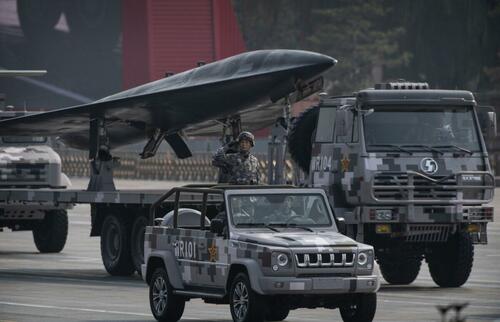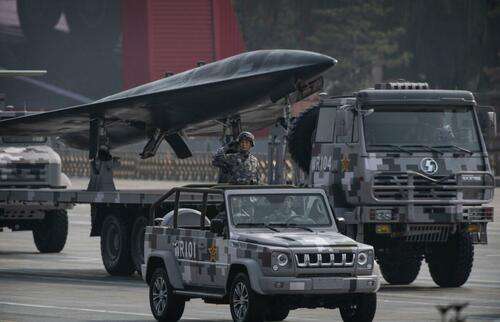It’s a grim picture of future conflicts, but one that the Chinese Communist Party (CCP) is nevertheless working to make a reality.
The CCP is investing in artificial intelligence (AI)-enabled platforms that it hopes will one day conduct lethal missions in wartime, wholly without human input or control.
Gregory Allen, director of the Wadhwani Center for AI and Advanced Technologies at the Center for Strategic and International Studies, says the regime is moving well beyond any attempt to keep a human in the AI decision-making loop.
“China is pursuing development of AI-enabled lethal autonomous weapons,” Allen wrote in a prepared testimony for an April 13 hearing of the U.S.-China Economic and Security Review Commission.
“The best available indications … suggest that China’s strategy is ambitious, moving beyond any sort of on-the-battlefield human supervision into increasingly autonomous AI-enabled warfare .”
Though the CCP is investing heavily in a broad array of new technologies, Allen says, AI is foremost among them. The regime’s capacity to build AI-driven machines of war is quickly reaching parity with that of the United States, and may even exceed it soon.
“U.S. leadership in the realm of military AI is not at all guaranteed,” Allen says.
“While the United States has important advantages, China may be able to quickly take the lead in government and military adoption of AI capabilities. This is an outcome that the United States should seek to prevent.”
A picture taken on Nov. 14, 2017, shows a Chinese-made Wing Loong II drone on display during the Dubai Airshow. (Karim Sahib/AFP via Getty Images) Autonomous AI Platforms ‘Inevitable’ The CCP’s pursuit of AI-driven weapons and other military platforms, though not well understood by many Americans, has been ongoing for years.
Allen notes that he first realized the remarkable ambition of such goals back in 2018. At that time, he attended a conference where he transcribed a speech made by Zeng Yi, a senior executive at China’s state-owned military company Norinco.
There, Zeng described Norinco’s ambitions—and the CCP’s expectations—for future implementation of AI weapons by saying that, “In future battlegrounds, there will be no people fighting.”
“Zeng predicted that by 2025, lethal autonomous weapons would be commonplace ,” Allen said, adding that Zeng had described the mass adoption of autonomous AI platforms as “inevitable.”
Allen also noted that CCP censors removed Zeng’s comments and even his participation from the official readout of the conference shortly thereafter.
“It was not in China’s interest to have that information in the open ,” Allen said.
Not long after that, however, the CCP-affiliated military company Ziyan began exporting its Blowfish A2 and A3 drones to the Middle East. The Blowfish, a helicopter-style drone capable of autonomously engaging with targets, using machine guns and missiles, was just the first realization of the regime’s ambition to transform war from a human domain into a robotic one.
Military Decision-Making Without Humanity The regime’s ambitions for AI go beyond killer robots. The CCP is also investing to develop AI capabilities related to military decision-making and command and control.
At the heart of the effort is the CCP’s goal of “intelligentization,” a transformation of warfare through the mass integration of AI, automation, and big data.
Zeng posited that “intelligence supremacy will be the core of future warfare” and that “AI may completely change the current command structure, which is dominated by humans” to one that is dominated by an “AI cluster” that operates “just like the brain of the human body.”
Building on that vision are Chinese companies like 4Paradigm, which was contracted by the CCP’s military wing to develop AI decision-making models and human-machine teaming software for use at the company and battalion levels.
Such programs essentially aim toward one end: the restructuring of the Chinese military into an increasingly centralized cadre of officers who direct swarms of AI-enabled autonomous systems to do the actual fighting.
Sam Kessler, an analyst for the North Star Support Group risk advisory firm, believes that the regime’s focus on shifting the burden of warfighting from humans to AI-enabled systems is indicative of a broader recognition among CCP leadership about the revolutionary nature of intelligent autonomous systems.
“The [Chinese military] places a great deal of emphasis on disruptive technologies like autonomous systems,” Kessler said in an email to The Epoch Times.
“Unmanned combat systems with digitized decision-making programs can potentially speed up the process of performing tasks on the battlefield,” Kessler added. “[These include] precision strikes, accurate reconnaissance, resupplying forces, and performing field modifications more precisely and effectively.”
Such capabilities, Kessler said, could provide even a meager military with a profound force multiplier, and could shift the balance of power in future conflicts.
“Whoever possesses this kind of technology can help make even the weakest or average conventional military power have an edge in a field of battle, or prolonging it, ” Kessler said.
Read more here…








